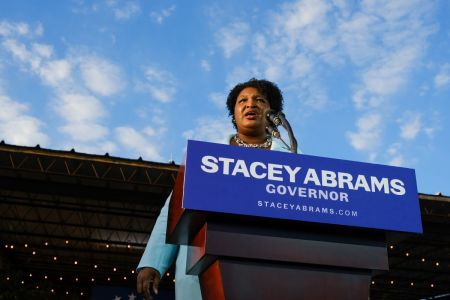Stacey Abrams tries to turn inflation anxieties into an abortion issue

Georgia Democratic gubernatorial nominee Stacey Abrams connected the topic of abortion to rising inflation on Wednesday, arguing that abortion is an "economic issue" after being told that inflation is reportedly a more significant issue for voters in the upcoming midterm elections.
During a Wednesday appearance on MSNBC's "Morning Joe," network contributor Mike Barnicle asked Abrams how she planned to alleviate Georgians' concerns about the increased cost of gas, food and other necessities, noting that abortion does not appear to hold the same level of priority for voters.
According to an 11Alive poll conducted by SurveyUSA, inflation and the economy are the top issues for Georgia voters.
The survey assessed 1,600 adults in the state online from Sept. 3 to Oct. 4. Twenty-eight percent of those surveyed said inflation is the most critical issue when they vote this fall, and 19% answered that the economy is their priority. Abortion was behind both in the poll, with 13% of participants saying it would impact their vote in the upcoming midterms.
Abrams argued that abortion is an "economic issue" that has been reduced to a cultural conversation, saying that voters are worried about affording gas and food because they have children.
"For women, this is not a reductive issue. You can't divorce being forced to carry an unwanted pregnancy from the economic realities of having a child," she said. "And so ... it's important for us to have both/and conversations."
The Democratic candidate believes that only politicians see abortion as a cultural conversation, while women of childbearing age view having kids as an "economic issue."
"It is a real biological and economic imperative conversation that we need to have," Abrams said.
At one point in the segment, Abrams claimed that women in Georgia are worried about whether they'll be living in poverty within five years, which is likely a reference to the Turnaway Study.
The study analyzed the economic and mental health outcomes for women denied abortions after five years, purporting that such women are more likely to live in poverty.
However, Michael J. New, researcher and associate scholar at the pro-life research organization Charlotte Lozier Institute, told The Christian Post in May that the study's low participation rate raises questions about its accuracy.
While there is some evidence that women with children struggle more financially than women who have abortions, the pro-life researcher noted that the Turnaway Study's data found these numbers "diminish over time."
"For instance, five years later, the poverty rate for women who carried pregnancies to term is nearly identical to the poverty rate for women who obtained abortions," New stated.
This is not the first time Abrams has advocated for abortion while on the campaign trail.
During an event at the Ray Charles Performing Arts Center in Atlanta last month, Abrams contended that a fetal heartbeat at six weeks gestation is a "manufactured" claim to convince people that men have a right to "control" women's bodies.
The nominee's comments were related to Georgia's heartbeat bill, also known as the Living Infants Fairness and Equality Act. The bill bans abortions after a fetal heartbeat becomes detectable, usually around six weeks gestation, but makes exceptions for rape, incest, threats to the mother's life, and if the fetus is unviable.
The law was passed in 2019, but a federal judge ruled it unconstitutional. After the U.S. Supreme Court overturned Roe v. Wade, restoring authority over abortion laws to states, a federal appeals court overturned the lower court ruling on July 20, allowing the law to go into effect.
Abrams argues the legislation shouldn't be called a "heartbeat bill" because "that's medically false, biologically a lie," a claim that pro-life medical experts refuted.
Dr. Donna Harrison, CEO of the American Association of Pro-Life Obstetricians and Gynecologists, an organization that boasts over 7,000 pro-life doctors, said that Abrams' statement ignores evidence from "basic embryology."
"In fact, at six weeks' gestation, the embryonic heart rhythmically contracts to pump blood through its arteries, which flows to the placenta to exchange carbon dioxide for oxygen," she wrote in a statement to CP last month.
Tara Sander Lee, the director of life sciences at the Charlotte Lozier Institute, who studied heart development at Harvard Medical School, said in a statement that the human heart starts beating 22 days after fertilization.
"A baby's heart is actively beating at six weeks gestation and will have already beat nearly 16 million times by 15 weeks," said Lee. "In fact, at six weeks, when Stacey Abrams says a heartbeat doesn't exist, that baby's heart is actually beating at about 110 beats per minute."





















